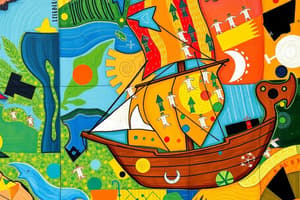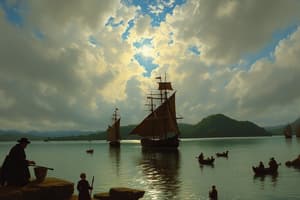Podcast
Questions and Answers
The Age of Exploration was primarily driven by the desire to find new trade routes and resources.
The Age of Exploration was primarily driven by the desire to find new trade routes and resources.
True (A)
The Moluccas were known for their lack of spices during the Age of Exploration.
The Moluccas were known for their lack of spices during the Age of Exploration.
False (B)
Cultural diversity emerged as a result of trade during the Age of Exploration.
Cultural diversity emerged as a result of trade during the Age of Exploration.
True (A)
Enlightenment thinkers had no influence on the leadership of the 18th century.
Enlightenment thinkers had no influence on the leadership of the 18th century.
One of the motivations for exploration included converting indigenous people to Buddhism.
One of the motivations for exploration included converting indigenous people to Buddhism.
The Treaty of Tordesillas was established in 1494 to divide the New World between Spain and Portugal.
The Treaty of Tordesillas was established in 1494 to divide the New World between Spain and Portugal.
The Mariner's Compass was invented in 1500.
The Mariner's Compass was invented in 1500.
The Spanish and Portuguese empires faced significant challenges due to the Treaty of Tordesillas.
The Spanish and Portuguese empires faced significant challenges due to the Treaty of Tordesillas.
The Persian Astrolabe was used extensively during the era of exploration in the 1650s.
The Persian Astrolabe was used extensively during the era of exploration in the 1650s.
The ethical dilemmas faced by explorers in the past are still relevant in modern-day challenges.
The ethical dilemmas faced by explorers in the past are still relevant in modern-day challenges.
Study Notes
Age of Exploration Overview
- Europeans began maritime exploration in search of new trading routes, wealth, and knowledge.
- High demand for Eastern goods, especially spices, drove exploration efforts.
- The Moluccas, known as the "Spice Islands," were a major source of spices located in present-day Indonesia.
Motives for Exploration
- Find new trade routes to minimize reliance on middlemen in the spice trade.
- Spread Christianity and convert indigenous populations.
- Increase understanding of new lands and cultures.
Technological Advances
- Persian Astrolabe (1650) facilitated navigation.
- Carta Marina (1516) provided detailed maps.
- St. Gabriel model (1498) showcased shipbuilding advancements.
- Mariner’s Compass (1570) improved directional navigation.
Cultural Impact
- Exploration led to cultural diversity, introducing new languages, customs, and traditions.
- Economic decisions driven by the need for resources had long-lasting effects on global trade.
Treaty of Tordesillas
- Established in 1494, it divided the New World between Spain and Portugal.
- A vertical line through eastern Brazil allocated land, resources, and people to these empires.
- The treaty favored Spanish and Portuguese interests but disregarded the indigenous populations.
Ethical Considerations
- Exploration raised ethical dilemmas regarding the treatment of indigenous peoples and their lands.
- Modern parallels can be drawn between historical exploration and contemporary global challenges.
Essential Questions
- Should cultures remain free from foreign influences?
- What drives economic decision-making?
- How did logic and reason contribute to the emergence of social sciences?
Enduring Understandings
- Exploration was driven by resource needs and led to significant cultural exchange.
- Technological advancements transformed production and trade practices.
- Enlightenment ideas influenced leadership during the 18th century, impacting governance and society in subsequent years.
Studying That Suits You
Use AI to generate personalized quizzes and flashcards to suit your learning preferences.
Related Documents
Description
Explore the significance of various artifacts from the Age of Exploration, such as the compass and astrolabe, and how they shaped the world during that period. Engage in discussions about cultural impacts and the ongoing influence of these discoveries on modern society.




